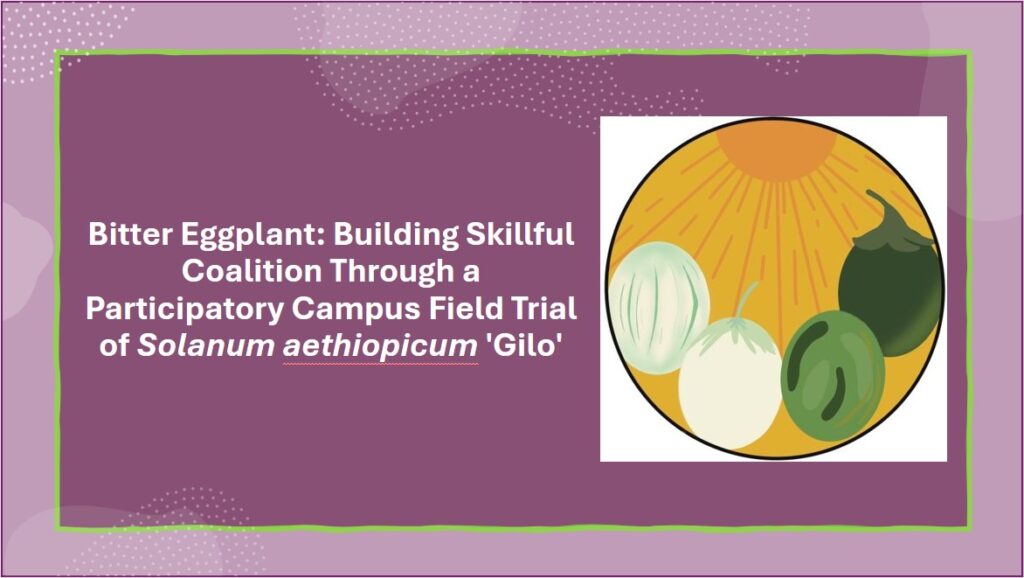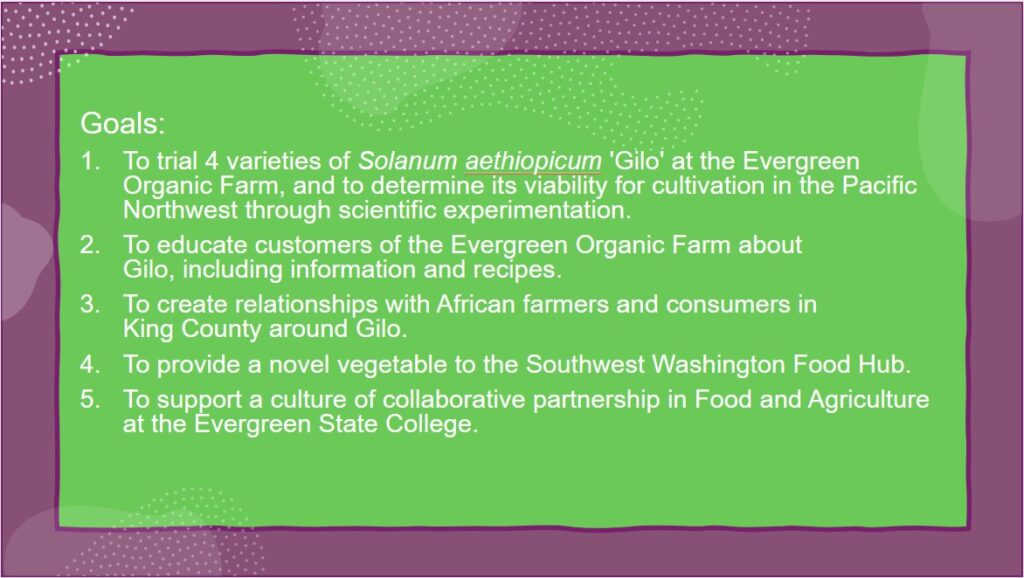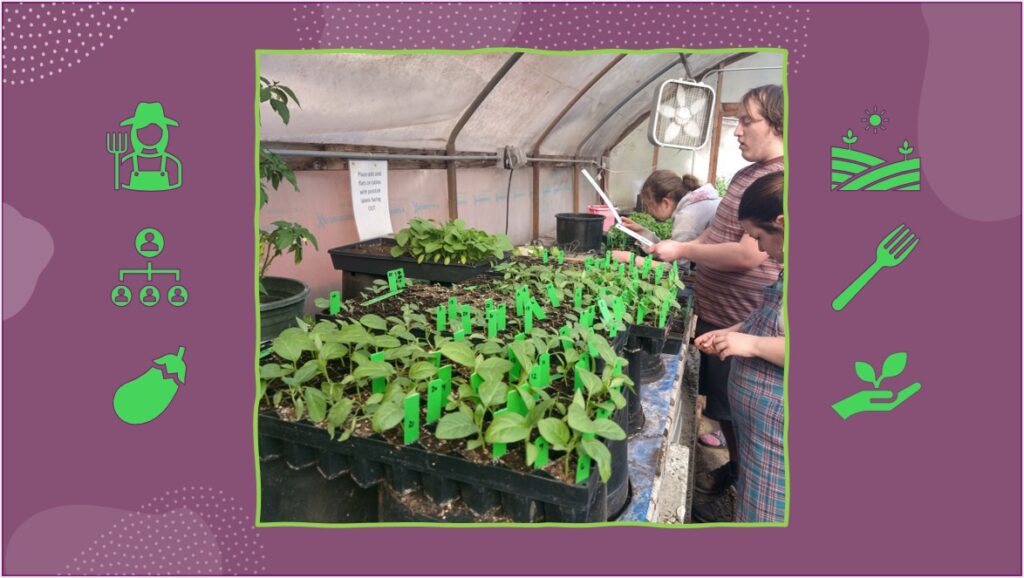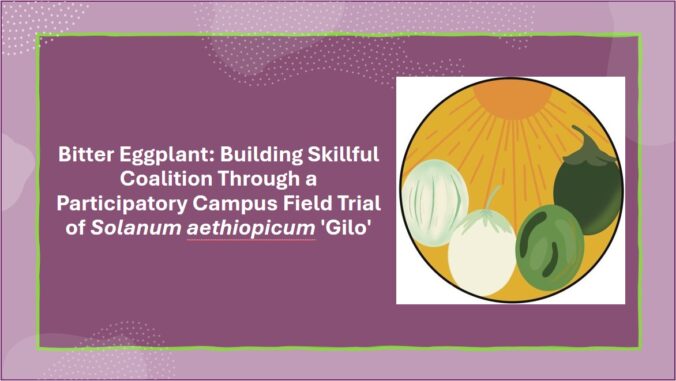On Wednesday, April 17th, 2024, The Food and Agriculture Path, The Evergreen State College Organic Farm, and the Fermentation Foundation S&A Club hosted a session for the 2024 Equity Symposium: “Cultivating Skillful Coalitions through Food and Agricultural Education”.
This roundtable panel and workshop features stories of students, faculty, and staff who are cultivating skillful coalitions through food and agricultural education on campus and around the world. Presenters will share short presentations that both describe and embody practices of skillful coalition that are essential to sustainable and just education about eating as an agricultural act. From the evolutionary significance of sweetness and bitterness to plant and human relationships being cultivated at the Evergreen State College organic farm as well as between our campus farm and the SW WA Food Hub, concluding with the collaboration of humans and bacteria to create a tasty ferment, these stories celebrate the building of liberatory land-based agricultural coalitions. Participants will be invited to engage in hands-on activities following the presentation to put into practice the skillful collaboration necessary for a resilient food system.
DescrIPTION of the Food and Agriculture Equity symposium session, “Cultivating Skillful Coalitions through Food and Agricultural Education”
Our group was invited to present at the session, and our presentation, “Bitter Eggplant: Building Skillful Coalition Through a Participatory Campus Field Trial of Solanum aethiopicum ‘Gilo'”, focuses on how we are building a coalition of students, faculty, staff, and businesses to support the work we are doing in the S. aethiopicum ‘Gilo’ project.

The Solanum aethiopicum ‘Gilo’ replicated variety trial project was conceived in January 2024, as I was looking for a way to tie together my interdisciplinary interests to design a senior capstone project surrounding the subjects of bitterness, plant breeding, and food justice. Because I am graduating in June 2024, I was unsure how I could create a substantive, upper division credit bearing, ethno-agricultural project with lasting impact in a very short time frame.
It was sheer luck that I was introduced to Gilo by our new farm faculty Ben Hunsdorfer, who has worked with bitter eggplant and recognized the potential for growing a novel crop in the Pacific Northwest. After undertaking research for a comprehensive literature review on Gilo, I realized that the richness and complexity of growing and marketing African eggplant in our community is just the sort of project I was looking for and one that would be a fitting capstone for my time at Evergreen. I also began to realize early on that to create a project that would have continuity despite my graduation, I would need to assemble a group of students, faculty, and staff whose goals aligned with mine to carry the project forward after I’m gone.

Our team of student researchers (Aaron Valva, Laura Reusche, Oonaugh Foster-Bill, Emerson Gregorio, and myself) all have deep roots in agriculture, with individual passions and experiences essential in supporting the Gilo variety trial throughout the project’s life. In addition to assembling our team of researchers, it was apparent that we would need extensive faculty and staff support both to guide us in our work and to provide stability for the project. Ben Hunsdorfer and Beth Leimbach, faculty and management at the Evergreen Organic Farm, have been incredibly supportive in terms of materials, land, and expertise. Dr. Sarah Williams has been instrumental in providing connections and context to the project, supporting our goal of marketing Gilo both as a culturally appropriate food and a novel vegetable for the PNW.
We are so lucky to be sponsored by Dr. Martha Rosemeyer and Dr. Robin Morgan, whose expertise in plant breeding and field experimentation is renowned; by joining our project, we gained the scientific support needed to conduct meaningful analysis and create a body of work that can launch a deeper study of Gilo grown in the Pacific Northwest.
Arts and Sciences Operations Manager Trisha Towanda and SIT Diane Nelson have coordinated with our group to ensure that proper lab equipment and safety training are available.
I applied for and received a fully funded capstone grant from the school to support the project, which has been used to procure seeds and equipment. Additionally, I approached two seed companies, North Circle Seeds and Thresh Seed Co., requesting donations for our variety trial and was pleasantly surprised at the willingness of companies to collaborate with our group of student researchers

Through the establishment of a diverse coalition of experts, we have formulated a coherent set of objectives that guide our ongoing efforts within this project. Our primary aim is to conduct trials on four different varieties of Solanum aethiopicum ‘Gilo’ at the Evergreen Organic Farm, aimed at assessing its potential for cultivation in the Pacific Northwest through rigorous scientific experimentation.
Additionally, we are dedicated to educating the patrons of the Evergreen Organic Farm about ‘Gilo’, offering valuable information and recipes to foster a deeper understanding and appreciation for this unique vegetable. Building meaningful relationships with African farmers and consumers in King County is another crucial goal, alongside providing a fresh vegetable supply to the Southwest Washington Food Hub.
Moreover, a key aspiration of ours is to instill a culture of collaborative partnership within the realm of Food and Agriculture at Evergreen State College, cultivating an environment that values cooperative efforts and shared success. These goals collectively underscore our commitment to fostering inclusive and skillful coalitions for the betterment of our community and beyond.

As I reflect on this project’s journey and the collaborative efforts that brought us to this point, I am filled with pride and accomplishment. The coalition of students, faculty, staff, and community partners that has been assembled has truly exemplified the power of working together towards a common goal.
Looking towards the future, I am excited about the possibilities that lie ahead. The goals we have set for ourselves are not just individual tasks, but reflections of a broader commitment to promoting sustainability, cultural awareness, and community engagement in food and agriculture.
As we pursue these objectives, I am confident that the momentum we have built will carry us forward even after the initial project ends. The spirit of collaboration and partnership that has defined our work will serve as a foundation for future endeavors, inspiring others to join us in creating a more resilient and interconnected food system.
Together, we have shown that through skillful coalition building and creative thinking, we can make a meaningful impact on the world around us.


Leave a Reply